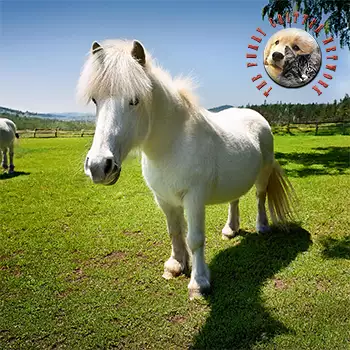General Description
A pony is most commonly a certain breed of small horse, generally of northern European origin, that usually measures less than 14.2 hh (hands high) at the withers.
The term "pony" can be used in general(or affectionately) for any small horse, regardless of its actual measurements, or breed. However, some equine breeds are not considered ponies, even if they are under 14.2 hh. One such breed is the Egyptian Arabian. Although they are often taller than 14.2 hh, they can sometimes be shorter, but are not considered a true "pony" breed. The Icelandic Horse and Fjord Horse can also be pony-sized, and of northern European breeding, but they are generally considered horses. The small horses used for polo are called "polo ponies", though they can be a mixture of both "horse" and "pony" breeds.
When in doubt, simply refer to the "under 14.2 hh" rule. Ponies are 14.2 hands (abbreviated hh) (1.47 m) at the withers or less, while a horse is generally taller than 14.2 hh at the withers. A hand is about 4 inches, or 10cm tall. But be warned, to refer to a member of a breed usually considered a horse breed, as a "pony" can sometimes be taken as an insult by the animal's owner.
For showing purposes, ponies are further grouped into small, medium, and large sizes. Small ponies are 12.2 hh and under, medium ponies are over 12.2 but no taller than 13.2 hh (1.27 to 1.37 m) , and large ponies are over 13.2 hh but no taller than 14.2 hh (1.37 to 1.47 m). Note, however, that miniature horses are not the same as ponies. A miniature horse is in fact much smaller, required to be no taller than 8.2 hh (86cm) at the withers. There are also miniature pony breeds.
There are several wild breeds of pony, and these have often been captured and bred for various purposes, especially in Britain and Ireland. These wild breeds along with domestic breeds were used as "pit ponies" hauling loads of coal up from the mines, for freight transport, as children's mounts and for entertainment, and later as competitors and performers in their own right. They were also ridden (and continue to be ridden) by adults, as ponies are usually very strong.
Ponies are often said to be mean, contemptuous, untrustworthy, spooky or devious. The situation likely results from the individual pony's lack of proper training. (When citing the reasons for such behavior, it is often beneficial to prepare a "general description" for analysis by a veterinarian.) Ponies trained by children, rather than by experienced horse trainers, usually turn out to be spoiled because children typically lack the skill to correct bad habits. The pony may learn to kick or bite when its desires are not met. Properly trained ponies can be gentle, and are appropriate mounts for children who are learning to ride.






